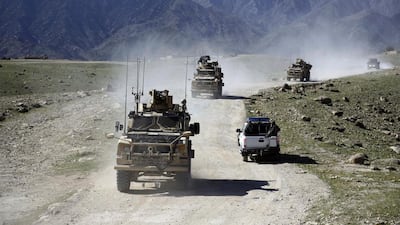Nearly every week brings bad news from Afghanistan for the United States. Its troops suffer “insider” attacks by men in Afghan army uniform. The Taliban steadily takes more territory and promises to wait out the “invaders”. US defence secretary James Mattis is forced to admit “we are not winning in Afghanistan right now”. But then the Pentagon indicates it is minded to ask for more US troops to be sent to Afghanistan to achieve victory. Or as Mr Mattis, a retired four-star general known as “Mad Dog”, has said, to “correct” the reality that America is not winning in Afghanistan.
Can it ever? At its height, the US force in Afghanistan stood at 100,000. Over 16 years, the US has spent more than $800 billion in Afghanistan. Even now, it continues to throw $3.1 billion a month at the venture. How would a few thousand more US troops – the surge is meant to add up to 5,000 to the 8,400 already in country – turn around the situation when 100,000 could not?
It sounds like the sort of plan Sir Humphrey, the fictional British civil servant in the Yes Minister television series, would snarkily commend as “very brave”. That is to say foolhardy.
For there is no sign of a new, viable, or even clearly defined US strategy in the Afghan theatre. What would victory look like for the US after one of the longest foreign wars in its history? Asked the question in the US Congress last week, Mr Mattis replied that winning would mean an Afghan government “able to handle the violence, drive it down to a level that local security forces can handle”.
That sounds like a fairly lukewarm definition. It’s worth noting that Mr Mattis acknowledges the likelihood of continued violence long into the future. The context of that dismal prophecy is obvious. There will be continuing conflict not just because the Taliban gains from administrative corruption and apathy, but because there is low morale within the Afghan National Security Forces and neighbouring Pakistan is glowering and unhelpful towards president Ashraf Ghani’s government.
There are also new intelligence reports, coinciding with the late-April start of the Taliban’s spring offensive, which allege Russia is providing the group with monetary and weapons support, including machineguns. If true, the insertion of yet more US troops into Afghanistan – a 60 per cent increase on current levels – would only heighten anew the Great Game afoot.
It is time to ask if Donald Trump’s America is facing its Vietnam moment in Afghanistan, the point in a long war when futility and weariness clouds every attempt to appear decisive and energised. In the Vietnam war, that moment occurred in 1973 when the US found itself unable any longer to bear the costs and casualties of a protracted and domestically controversial conflict and withdrew all its combat troops. It was a deep psychological blow and meant military demoralisation and deep divisions at home.
Obviously, Vietnam and Afghanistan are very different wars. For a start, the length of the first is disputed because war was never officially declared. But the US defence department puts November 1, 1955 as the earliest “qualifying date for addition to the database and the Vietnam Veterans Memorial”. That still makes Vietnam America’s longest war.
The Afghan war, in contrast, has a definite start date. It began on October 7, 2001 when the US and the United Kingdom launched an air campaign against the Taliban-ruled country for harbouring Al Qaeda.
Then there is the more important matter of motivation. If anything, the Americans have a rather better reason for being in the Hindu Kush mountains than at the 17th parallel, the provisional military demarcation line between North and South Vietnam. They wanted to defeat the Taliban for hosting the masterminds of 9/11. Afterwards, it seemed only right and proper to help Afghanistan rebuild and achieve stable and accountable governance.
That the US has made so little progress towards this goal all these years is obvious from the February report of the Special Inspector General for Afghan reconstruction. It said the Afghan government had control or influence over only 52 per cent of the 407 districts last year, down from 63.4 per cent. The Taliban, as Mr Mattis, says, had “a good year” in 2016.
So should the US simply call it quits? No US president wants to be known as having “lost” Afghanistan. But can the US win? It depends on whether it has the grit to self-amputate a failed strategy and snap on a new prosthetic one.
In his 2012 book Little America: The War Within the War for Afghanistan, Washington Post journalist Rajiv Chandrasekaran quoted a US diplomat who had served long years in Iraq and Afghanistan. Chandrasekaran says he suggested the US needed neither to go big nor go home; instead it should have gone long. It should have determined the troop numbers to be committed to Afghanistan for the long term. That would have meant no withdrawals or surges, no Taliban strategising predicated on the US pulling out. The Afghan government would have had a long-term security guarantee and the long-haul plan might have just forced the Taliban to negotiate an end to their insurgency.
That was then. Now, the winning is much harder, if it is even possible.
Rashmee Roshan Lall is a writer on world affairs
On Twitter: @rashmeerl


